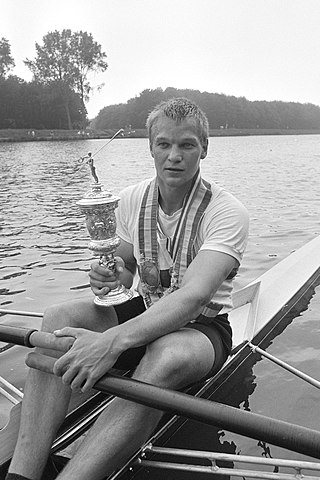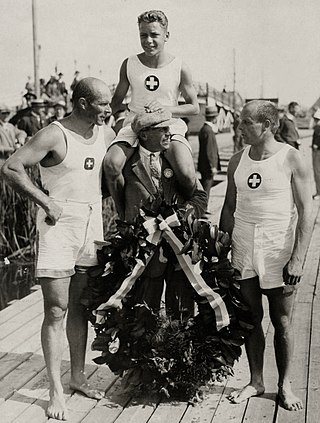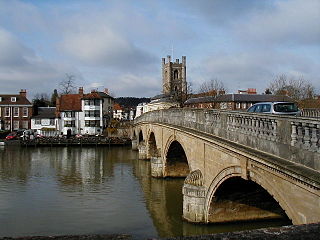
The men's single sculls event was a rowing event conducted as part of the Rowing at the 1964 Summer Olympics programme. It was held from 11 to 15 October at the Toda Rowing Course. There were 13 competitors from 13 nations, with each nation limited to a single boat in the event. The event was won by Vyacheslav Ivanov of the Soviet Union, his third consecutive victory in the event. Ivanov's three gold medals in the event remains tied for the best results for any individual single sculler ; only Ekaterina Karsten has more medals in (women's) single sculls, though she took only two golds along with a silver and a bronze. The second spot on the podium was also a repeat of 1960; Achim Hill of the United Team of Germany became the sixth man to win multiple single sculls medals by repeating as silver medalist. Bronze this time went to Gottfried Kottmann of Switzerland, that nation's first medal in the event since 1924.

The men's single sculls competition at the 1992 Summer Olympics in Barcelona was held from 27 July to 1 August at Lake of Banyoles. The event was an open-style, individual rowing event conducted as part of the Rowing at the 1992 Summer Olympics programme. There were 22 competitors from 22 nations, with each nation limited to a single boat in the event. The event was won by Thomas Lange of Germany, the fourth man to successfully repeat as Olympic champion. It was the first appearance of "Germany" since 1936, though German rowers representing the United Team of Germany, West Germany, and East Germany had won 10 medals in 8 Games from 1960 to 1988. Václav Chalupa of Czechoslovakia took silver, that nation's first medal in the men's single sculls. Poland's Kajetan Broniewski earned that nation's first medal in the event since 1960 with his bronze.

The men's single sculls event was part of the rowing programme at the 1928 Summer Olympics. It was one of seven rowing events for men and was the seventh appearance of the event, which had been on the programme for every Games since rowing was added in 1900. There were 15 competitors, each from a different nation. The event was won by Bobby Pearce of Australia, the nation's first medal in the event. Silver went to Ken Myers of the United States, extending that nation's podium streak to three Games. David Collet of Great Britain took bronze; that nation had also earned a medal each time it appeared and had a five-Games podium streak.

The men's coxed pair event was part of the rowing programme at the 1928 Summer Olympics. It was one of seven rowing events for men and was the fourth appearance of the event. It was held from 3 to 10 August near Sloten, Amsterdam. There were 6 boats from 6 nations, with each nation limited to one boat in the event. The event was won by the Swiss team, the nation's second consecutive victory in the event. Brothers Hans Schöchlin and Karl Schöchlin rowed, with Hans Bourquin the coxswain. Another pair of brothers took silver: France's Armand Marcelle and Édouard Marcelle. The Belgian bronze medal team consisted of Léon Flament, François de Coninck, and Georges Anthony; it was the nation's first medal in the event.

The men's coxed four event was part of the rowing programme at the 1928 Summer Olympics. It was one of seven rowing events for men and was the fifth appearance of the event. It was held from 3 to 10 August. There were 11 boats from 11 nations, with each nation limited to a single boat in the event. The event was won by Italy, the nation's first medal in the men's coxed four. The Italian team dethroned two-time reigning champion Switzerland, beating the Swiss crew in both the semifinals and the final. Switzerland's silver medal brought its podium streak in the event to three Games; the United States had its two-Games medal streak end. Poland took bronze, its first medal in the event.

The men's single sculls competition at the 1972 Summer Olympics in Munich took place from 27 August to 2 September at the Olympic Reggatta Course in Oberschleißheim. There were 18 competitors from 18 nations, with each nation limited to a single boat in the event. The event was won by Yury Malyshev of the Soviet Union, the nation's fifth victory in the event; the Soviets returned to the top of the podium after having their four-Games (1952–1964) winning streak broken in 1968. Alberto Demiddi of Argentina took silver, the seventh man to win multiple medals in the single sculls. Wolfgang Güldenpfennig earned bronze, the first medal for East Germany as a separate team.

The men's coxed four competition at the 1972 Summer Olympics in Munich took place from 27 August to 2 September at the Olympic Reggatta Course in Oberschleißheim. There were 14 boats from 14 nations, with each nation limited to a single boat in the event. The event was won by West Germany; it was the nation's first medal as a separate team, but the third time in four Games that a West German crew had won gold. East Germany repeated as silver medallists, though with a new crew. Bronze went to Czechoslovakia, the nation's first medal in the men's coxed four since 1952.

The men's single sculls competition at the 1952 Summer Olympics took place at Meilahti, Helsinki, Finland. The event was held from 20 to 23 July. There were 18 competitors from 18 nations, with each nation limited to a single boat in the event. The event was won by Yuriy Tyukalov of the Soviet Union, in the nation's debut at the Games. Defending champion Mervyn Wood took silver, the fourth medal in five Games for Australia. Teodor Kocerka's bronze was Poland's first medal in the men's single sculls.

The men's single sculls competition at the 1956 Summer Olympics took place at Lake Wendouree, Ballarat, Australia. The event was held from 23 to 27 November. There were 12 competitors from 12 nations, with each nation limited to a single boat in the event. The event was won by Vyacheslav Ivanov of the Soviet Union, the nation's second consecutive victory in the men's single sculls Ivanov's first of his three consecutive Olympic titles. He was so thrilled when he was presented with his gold medal that he jumped up and down with joy-and dropped the medal into Lake Wendouree. He immediately dived into the lake to retrieve it, but could not find it. After the games were over he was given a replacement medal. Stuart Mackenzie took silver, making it the second consecutive Games with an Australian runner-up. American John B. Kelly Jr., after missing the finals in 1948 and 1952 by 0.4 seconds and 0.2 seconds respectively, reached the final and took the bronze medal this time.

The men's single sculls competition at the 1960 Summer Olympics took place at Lake Albano, Italy. The event was held from 30 August until 3 September. There were 13 competitors from 13 nations, with each nation limited to one boat in the event. The event was won by Vyacheslav Ivanov of the Soviet Union, the second man to successfully repeat as Olympic champion. It was the third consecutive Soviet victory in the event, with Yuriy Tyukalov winning in 1952 before Ivanov's victories in 1956 and 1960. Ivanov would go on to win again in 1964, becoming the first man to win 3 gold medals in the event. The silver medal went to Achim Hill of the United Team of Germany, the first medal in the men's single sculls for the combined team and the first single sculls medal for any German rower since 1936. Teodor Kocerka of Poland took bronze. Ivanov and Kocerka were the fourth and fifth men to win multiple medals of any colour in the event, with Kocerka previously taking bronze in 1952. It was Kocerka's third straight final in the event, placing fourth between his two bronzes. Australia's three-Games podium streak ended when Stuart Mackenzie fell ill and could not compete.

The men's single sculls competition at the 1968 Summer Olympics took place at Virgilio Uribe Rowing and Canoeing Course, Mexico. The event was held from 15 to 19 October. There were 17 competitors from 17 nations, with each nation limited to a single boat in the event. The event was won by Jan Wienese of the Netherlands, with Jochen Meißner of West Germany taking silver and Alberto Demiddi of Argentina earning bronze. It was the first medal in men's single sculls for each of the three nations. The Soviet Union's four-Games winning streak in the event ended; three-time champion Vyacheslav Ivanov was left off the team in favor of Viktor Melnikov; Melnikov finished fourth in his semifinal and did not reach the main final.

The men's single sculls competition at the 1976 Summer Olympics took place at Notre Dame Island Olympic Basin, Canada. The event was held from 18 to 25 July. There were 15 competitors from 15 nations, with each nation limited to a single boat in the event. The event was won by Pertti Karppinen of Finland, the nation's first medal in the men's single sculls. Karppinen would go on to win three consecutive golds in the event, matching the Soviet Union's Vyacheslav Ivanov who did the same from 1956 to 1964. Silver went to Peter-Michael Kolbe of West Germany; East Germany took its second consecutive bronze medal in the event, this time with Joachim Dreifke as the rower.

The men's single sculls rowing competition at the 1980 Summer Olympics took place at Krylatskoye Sports Complex Canoeing and Rowing Basin, Moscow, Soviet Union. The event was held from 20 to 27 July. There were 14 competitors from 14 nations, with each nation limited to a single boat in the event. The event was won by Pertti Karppinen of Finland, his second of three consecutive victories from 1976 to 1984. Karppinen was the eighth man to win multiple medals in the event. Silver went to Vasil Yakusha of the Soviet Union, the nation's sixth medal in eight Games. East Germany took a third consecutive bronze medal, all by different rowers as Peter Kersten was the nation's men's single sculler this Games.
The men's single sculls competition at the 1936 Summer Olympics took place at Grünau Regatta Course, near Berlin, Germany. The event was held from 11 to 14 August. There were 20 competitors from 20 nations, with each nation limited to a single boat in the event. The event was won by Gustav Schäfer of Germany, the nation's first victory in the event and first medal of any colour in the men's single sculls since 1908. Josef Hasenöhrl took silver, Austria's first medal in the event. Dan Barrow earned bronze, extending the United States' podium streak in the event to five Games; the Americans had taken a medal in each of the six times they competed in the event.

The men's eight competition at the 1948 Summer Olympics took place at Henley-on-Thames, near London. It was held from 5 to 9 August. There were 12 boats from 12 nations, with each nation limited to a single boat in the event. The event was won by the United States, the nation's sixth consecutive and eighth overall gold medal in the men's eight; the Americans had won every time they competed. Great Britain, the only other nation to have won in the event, finished second for its first medal in the event since 1928. Norway took bronze, its first medal in the men's eight since 1920.

The men's coxed pair competition at the 1948 Summer Olympics in London took place at Henley-on-Thames, London. It was held from 5 to 9 August. There were 9 boats from 9 nations, with each nation limited to a single boat in the event. The event was won by the Danish team, rowers Finn Pedersen and Tage Henriksen and coxswain Carl-Ebbe Andersen; it was the first medal in the men's coxed pair for Denmark. Italy won its second consecutive silver medal, with Giovanni Steffè, Aldo Tarlao, and cox Alberto Radi. Hungary also earned its first medal in the event, a bronze for Antal Szendey, Béla Zsitnik, and cox Róbert Zimonyi. The French three-Games pre-war podium streak ended.

The men's coxed four competition at the 1948 Summer Olympics in London took place at Henley-on-Thames, London. It was held from 5 to 9 August. There were 16 boats from 16 nations, with each nation limited to a single boat in the event. The event was won by the United States, the nation's first victory in the men's coxed four. Switzerland earned silver, the nation's fifth medal in the event in six Games. Denmark took its first medal in the men's coxed four since 1912, with bronze.

The men's coxed pair competition at the 1952 Summer Olympics took place at Meilahti, Finland. It was held from 20 to 23 July. There were 15 boats from 15 nations, with each nation limited to a single boat in the event. The event was won by French team Raymond Salles, Gaston Mercier, and coxswain Bernard Malivoire; it was the nation's first victory in the event. Germany, which had won the event in 1936 but had been excluded from the 1948 Games after World War II, took silver. Sweden, the defending champions, had an all-new crew of Svend Ove Pedersen, Poul Svendsen, and cox Jørgen Frantzen; they took bronze.

The men's coxed four competition at the 1960 Summer Olympics took place at Lake Albano, Italy. It was held from 31 August to 3 September. There were 21 boats from 21 nations, with each nation limited to a single boat in the competition. The event was won by the United Team of Germany in its debut in the event. Silver went to the French crew, the nation's first medal in the event since 1936. The defending champions Italy received bronze this time. In an event which saw constant turnover even from consistently strong nations, three members of the Italian team returned from the 1956 gold-medal crew to earn a second medal this Games: Romano Sgheiz, Ivo Stefanoni, and Franco Trincavelli were only the 2nd, 3rd, and 4th men to earn multiple medals in the coxed four.

The men's double sculls event at the 2020 Summer Olympics took place from 23 to 28 July 2021 at the Sea Forest Waterway. 26 rowers from 13 nations competed.















